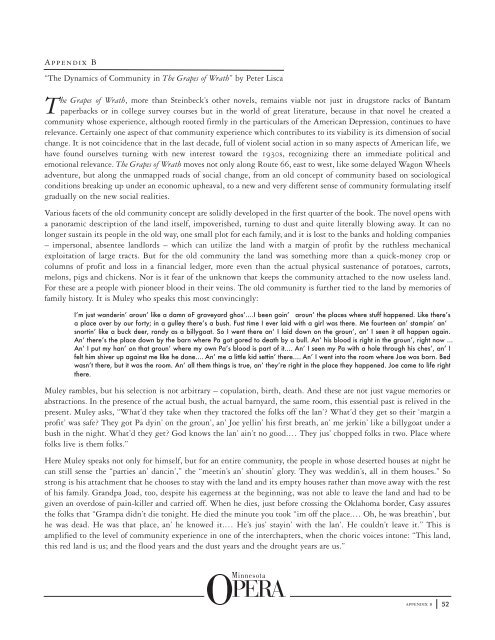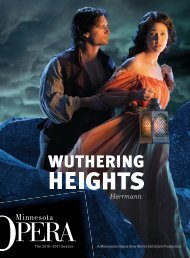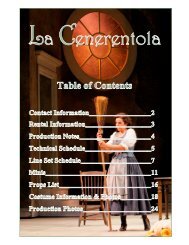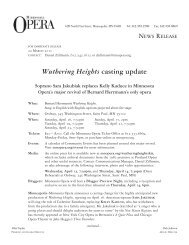You also want an ePaper? Increase the reach of your titles
YUMPU automatically turns print PDFs into web optimized ePapers that Google loves.
Appendix B<br />
“The Dynamics of Community in The <strong>Grapes</strong> of Wrath” by Peter Lisca<br />
The <strong>Grapes</strong> of Wrath, more than Steinbeck’s other novels, remains viable not just in drugstore racks of Bantam<br />
paperbacks or in college survey courses but in the world of great literature, because in that novel he created a<br />
community whose experience, although rooted firmly in the particulars of the American Depression, continues to have<br />
relevance. Certainly one aspect of that community experience which contributes to its viability is its dimension of social<br />
change. It is not coincidence that in the last decade, full of violent social action in so many aspects of American life, we<br />
have found ourselves turning with new interest toward the 1930s, recognizing there an immediate political and<br />
emotional relevance. The <strong>Grapes</strong> of Wrath moves not only along Route 66, east to west, like some delayed Wagon Wheels<br />
adventure, but along the unmapped roads of social change, from an old concept of community based on sociological<br />
conditions breaking up under an economic upheaval, to a new and very different sense of community formulating itself<br />
gradually on the new social realities.<br />
Various facets of the old community concept are solidly developed in the first quarter of the book. The novel opens with<br />
a panoramic description of the land itself, impoverished, turning to dust and quite literally blowing away. It can no<br />
longer sustain its people in the old way, one small plot for each family, and it is lost to the banks and holding companies<br />
– impersonal, absentee landlords – which can utilize the land with a margin of profit by the ruthless mechanical<br />
exploitation of large tracts. But for the old community the land was something more than a quick-money crop or<br />
columns of profit and loss in a financial ledger, more even than the actual physical sustenance of potatoes, carrots,<br />
melons, pigs and chickens. Nor is it fear of the unknown that keeps the community attached to the now useless land.<br />
For these are a people with pioneer blood in their veins. The old community is further tied to the land by memories of<br />
family history. It is Muley who speaks this most convincingly:<br />
I’m just wanderin’ aroun’ like a damn oF graveyard ghos’.…I been goin’ aroun’ the places where stuff happened. Like there’s<br />
a place over by our forty; in a gulley there’s a bush. Fust time I ever laid with a girl was there. Me fourteen an’ stampin’ an’<br />
snortin’ like a buck deer, randy as a billygoat. So I went there an’ I laid down on the groun’, an’ I seen it all happen again.<br />
An’ there’s the place down by the barn where Pa got gored to death by a bull. An’ his blood is right in the groun’, right now …<br />
An’ I put my han’ on that groun’ where my own Pa’s blood is part of it.… An’ I seen my Pa with a hole through his ches’, an’ I<br />
felt him shiver up against me like he done.… An’ me a little kid settin’ there.… An’ I went into the room where Joe was born. Bed<br />
wasn’t there, but it was the room. An’ all them things is true, an’ they’re right in the place they happened. Joe came to life right<br />
there.<br />
Muley rambles, but his selection is not arbitrary – copulation, birth, death. And these are not just vague memories or<br />
abstractions. In the presence of the actual bush, the actual barnyard, the same room, this essential past is relived in the<br />
present. Muley asks, “What’d they take when they tractored the folks off the lan’? What’d they get so their ‘margin a<br />
profit’ was safe? They got Pa dyin’ on the groun’, an’ Joe yellin’ his first breath, an’ me jerkin’ like a billygoat under a<br />
bush in the night. What’d they get? God knows the lan’ ain’t no good.… They jus’ chopped folks in two. Place where<br />
folks live is them folks.”<br />
Here Muley speaks not only for himself, but for an entire community, the people in whose deserted houses at night he<br />
can still sense the “parties an’ dancin’,” the “meetin’s an’ shoutin’ glory. They was weddin’s, all in them houses.” So<br />
strong is his attachment that he chooses to stay with the land and its empty houses rather than move away with the rest<br />
of his family. Grandpa Joad, too, despite his eagerness at the beginning, was not able to leave the land and had to be<br />
given an overdose of pain-killer and carried off. When he dies, just before crossing the Oklahoma border, Casy assures<br />
the folks that “Grampa didn’t die tonight. He died the minute you took “im off the place.… Oh, he was breathin’, but<br />
he was dead. He was that place, an’ he knowed it.… He’s jus’ stayin’ with the lan’. He couldn’t leave it.” This is<br />
amplified to the level of community experience in one of the interchapters, when the choric voices intone: “This land,<br />
this red land is us; and the flood years and the dust years and the drought years are us.”<br />
appendix b 52








